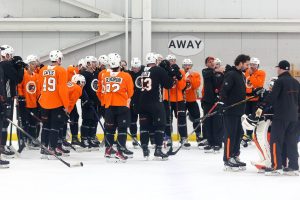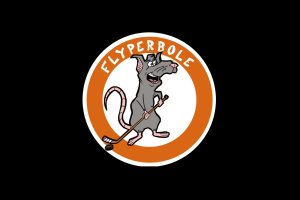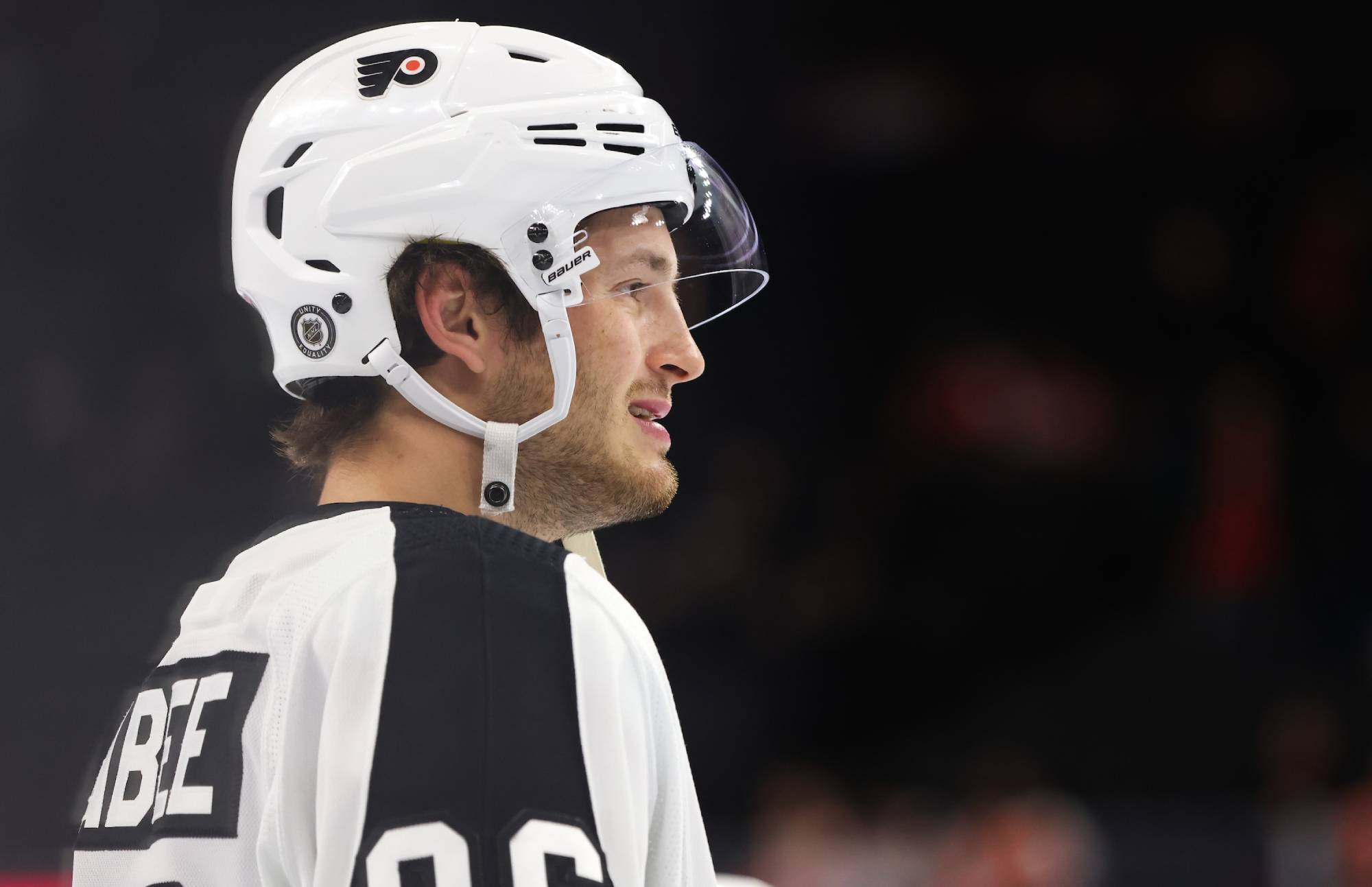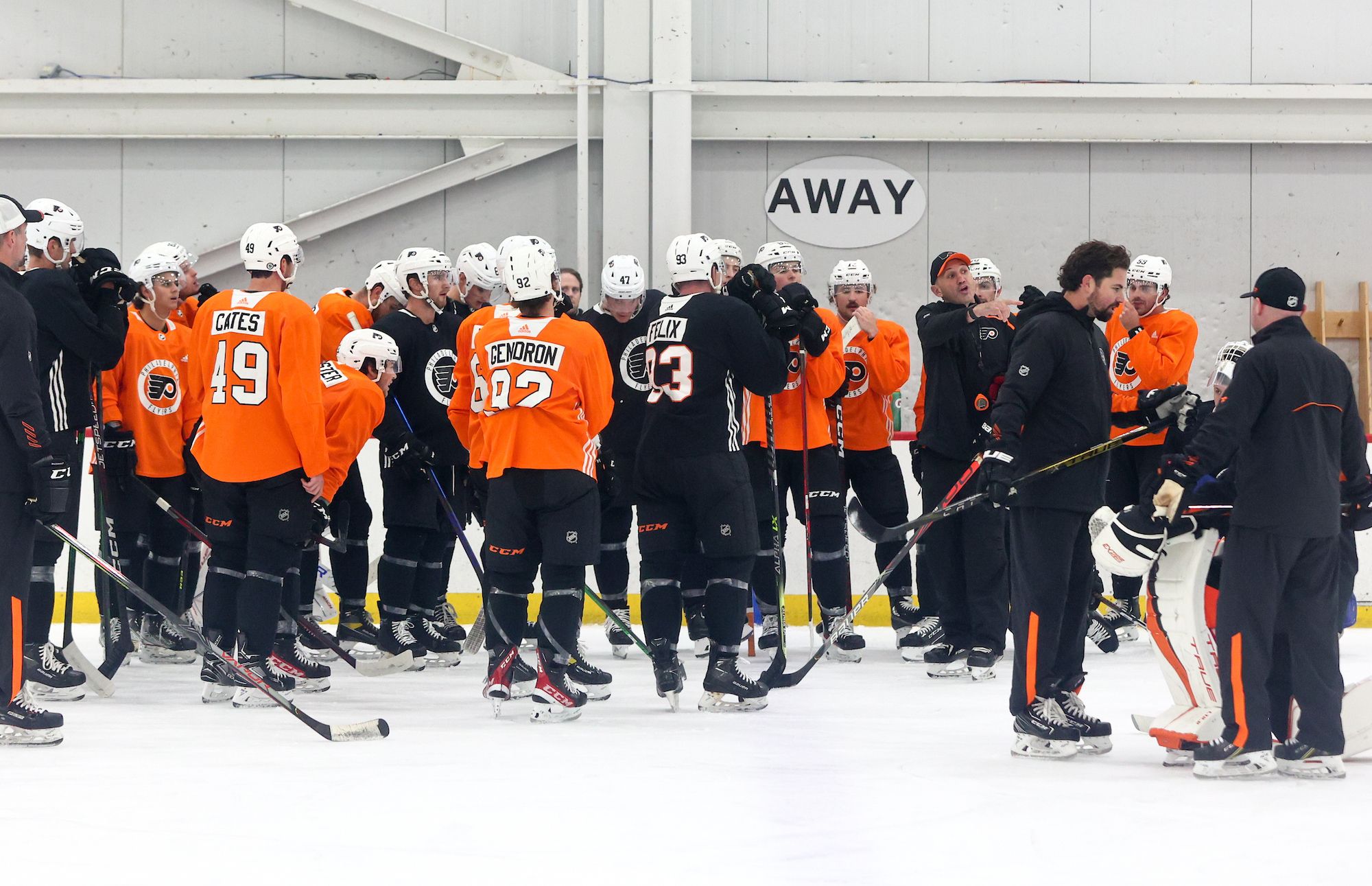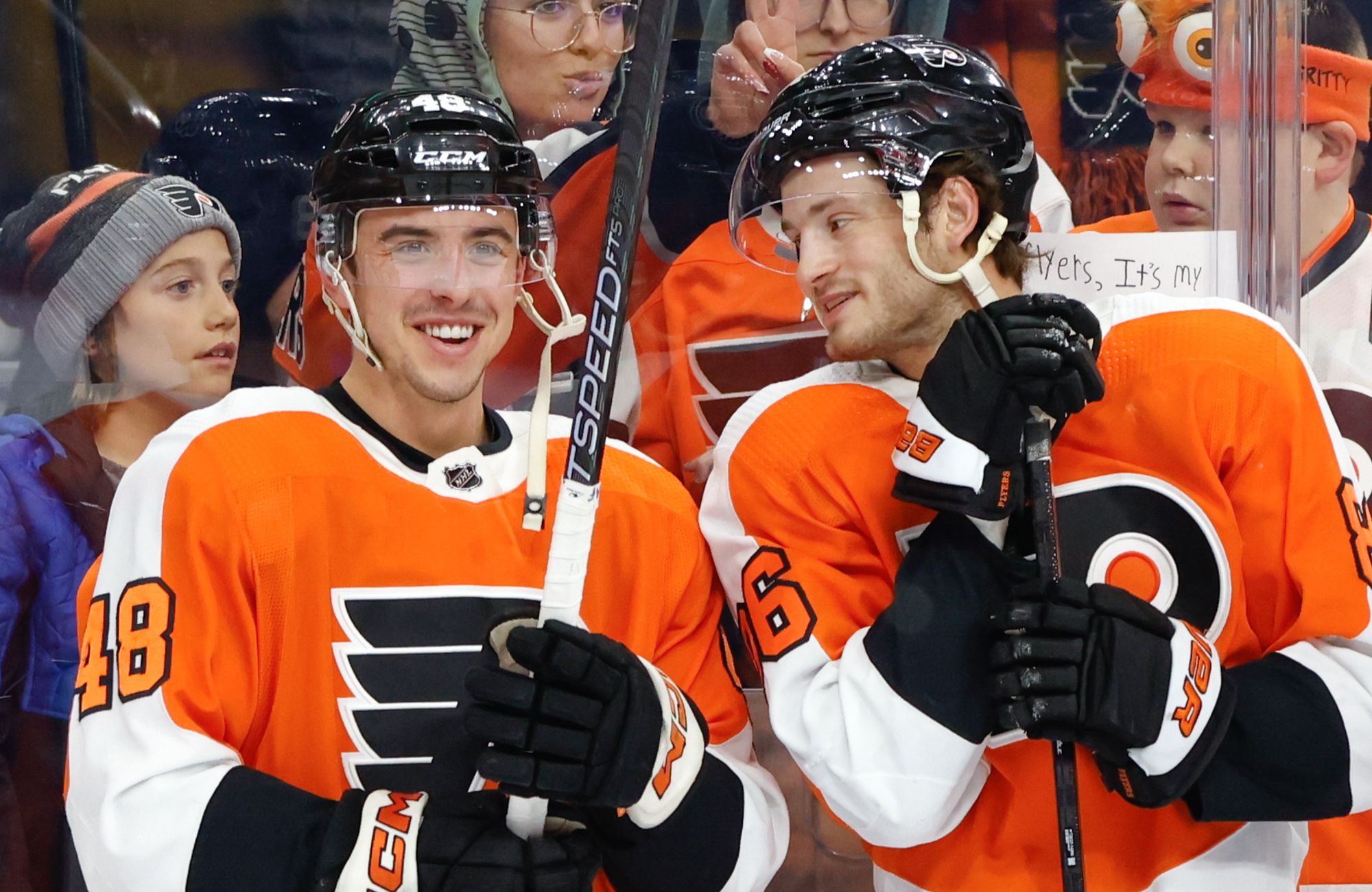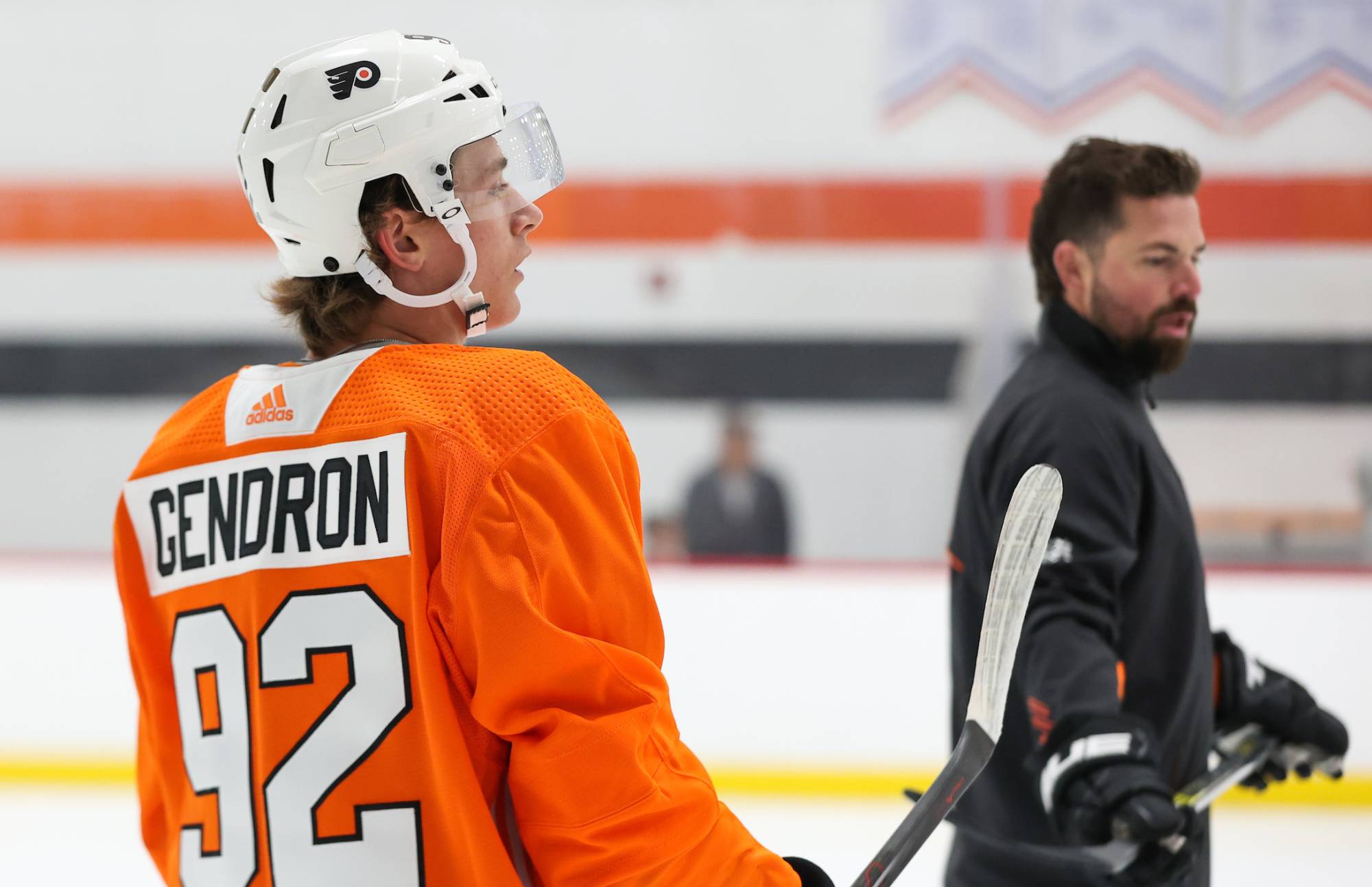BSH: This is a question from one of our readers, but I have to ask since we talked about you playing–
Ron Hextall: … I get it Travis, dumb question coming, you’re gonna blame it on one of your readers… [laughter]
[laughter] What’s your relationship with Chris Chelios like these days?
I don’t know. I think you guys made a big deal out of our little rendezvous in the press box there. I don’t know if people thought that we should be throwing rights or what. But I’ve got a lot of respect for Chris and we’ve talked many times, as much as it might disappoint people, we’ve talked many times over the years.
I know you signed your son [Brett Hextall] to an AHL contract this week. What’s it like negotiating a contract with your son?
Oh, I actually didn’t do that one. That one I didn’t wanna do and I passed it on to Barry Hanrahan there. I felt like there was a little bit of a conflict of interest there, but I had been asked about it and I said yesterday that if his last name wasn’t Hextall he probably would’ve been signed a while back.
I put some thought into it and I think Brett did too. I had some push from around here because he’s the type of player that we need with the Phantoms. He plays with a lot of sandpaper and this isn’t gratuitous, he’s a good two-way player that we feel can help our attitude and our culture. His name is what it is but if it was something else he would’ve been signed as well.
The Phantoms, at times in the last five years when they were in Glens Falls, they were one of the worst teams in the AHL. I don’t think they made the playoffs once. Now that they’re moving to Allentown, the facilities are certainly better. You’ve talked about that this offseason. How committed is the organization to putting a strong AHL club on the ice, not only for the fans in Allentown but just to create a winning environment for these players that are younger and in the organization?
Well, that was one of our focuses this summer. To put a better team in there. I think that the Phantoms used to be a team that players took a lot of pride in playing for and the winning atmosphere and everything was terrific.
I think somehow that slipped away, whether it was being in Glens Falls — and that’s not a knock on the city, it’s a great little city — but the facilities, the weight room, the locker room and all that need some work. I’m not blaming that but I think there are some areas that we can get better at and we’ve gotta recreate the culture that was there years ago.
It does matter to us. That’s our minor league team. That’s where we develop players and that’s where we develop attitudes. It’s important. That doesn’t mean we’re gonna sign a bunch of older players and just try to win the Calder Cup. We need to develop players but part of developing is developing a winning attitude. So yeah, it was a focus and it’s important to us.
One more from a reader here: You guys are going to induct Eric Lindros into the team’s Hall of Fame this year. Do you think he belongs in the Hockey Hall of Fame?
 More on Lindros
More on Lindros 
People ask me that all the time. I don’t have an answer there. I’d have to look long and hard at the Hall of Fame there.
I can say this. Eric had some great years here. Some Hall of Fame years. He was a package of skill and power that I’m not sure the league’s seen since him. He was a terrific player. I guess the only thing from my side is did he play long enough? I don’t know that.
I’m not saying he did or he didn’t but I haven’t studied the Hall of Fame enough to really give an educated opinion on whether he belongs there. But I will say for a number of years there, in my mind, he was a Hall of Fame player.
One final question here and then we’ll let you go. I think it was the day you were introduced as general manager you talked about the use of analytics as something that’s important for an NHL team to focus on these days. This summer you hired Ian Anderson as your manager of hockey analytics.
Can you elaborate on his role and what sort of things that department will be digging into and how it’ll be implemented on the ice?
I think analytics have been around in hockey probably more than people think. I think until this summer it was kind of one of those quiet avenues that teams used. I don’t think every team used them but I think a lot of teams have, and for whatever reason it kind of came to the forefront this summer.
But we will use them going forward. It’s a tool. I think you’ve gotta be really, really careful with it. I view it more as an aid than a decision maker. I think it sometimes will point to areas of concern for your team or individuals and the coaches will delve further into it. But it’s not gonna be a decision maker, but I think that it’s something, again, I’ve always been interested in. There is something there, no question. It can help an organization and I think as we move along here it will develop more and more.
But again, the way I look at it, there’s a big pie. That’s one little piece, whether it’s five percent or seven percent or whatever it is, it’s a little piece. When we look at how close all the teams are now and how close the games are and how close some teams are to making or not making the playoffs, it’s five to seven percent of the lot. And I’m not specifically saying that’s the number but it’s a piece that we can use as a tool.
Yeah, when you say “it” … “analytics” is kind of just, to me it’s just a word and it pulls in a ton of different concepts. Can you elaborate on what “it” means and some of the specific things you might take into account?
I don’t really want to talk specifically about what we do or what’s important to us, whatever. But I think we all know kind of what’s out there and it’s all intriguing. I think there are individual things we can use for individual players. There’s also some team stuff that we’ll use but I don’t care to elaborate on it any more than that.
***
Our thanks to Ron Hextall for taking time out of his schedule to chat with us. Be sure to check the other two parts of our interview: Part 1 on the defense and Part 2 on the forwards, Steve Mason and potential.

